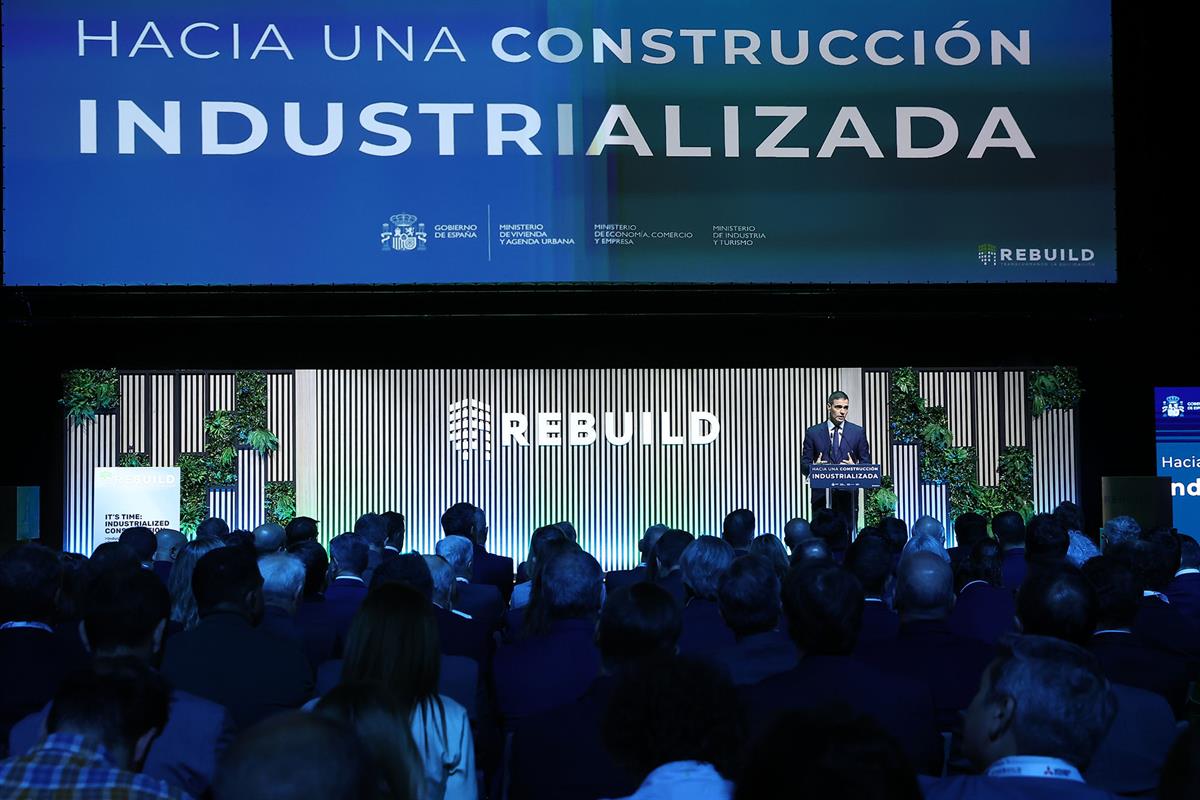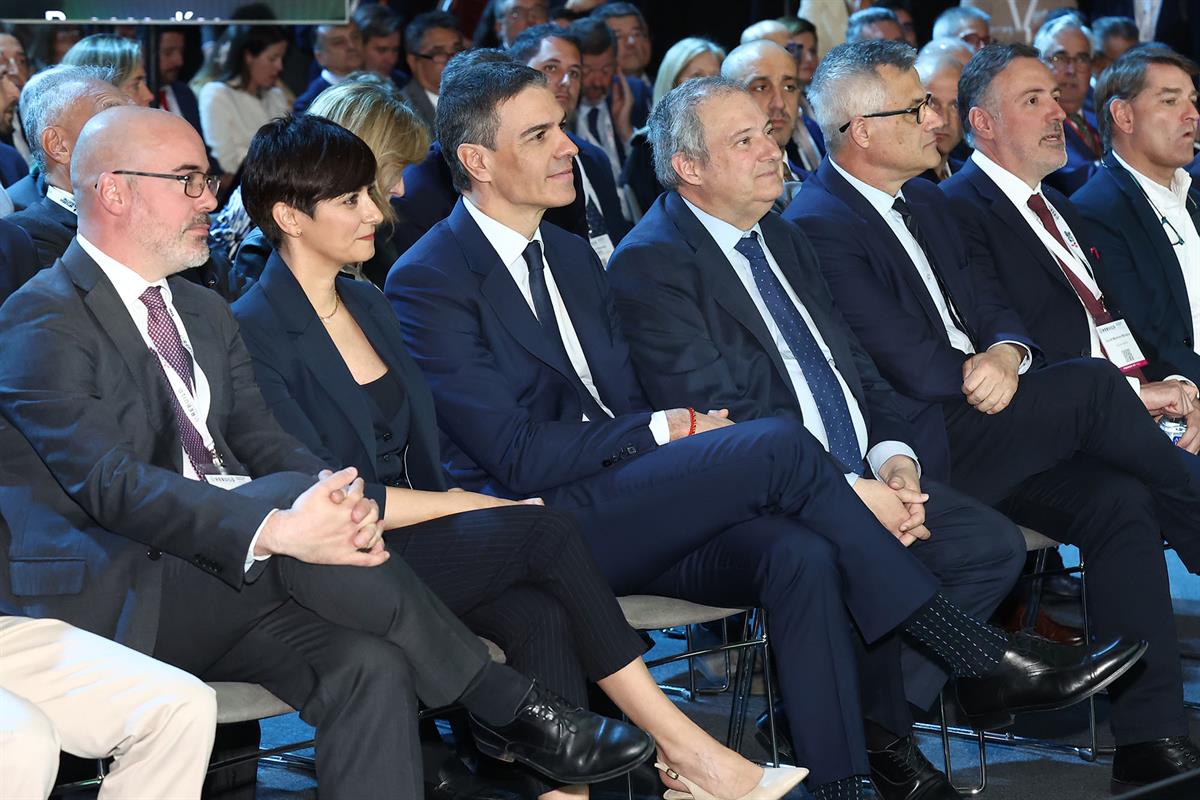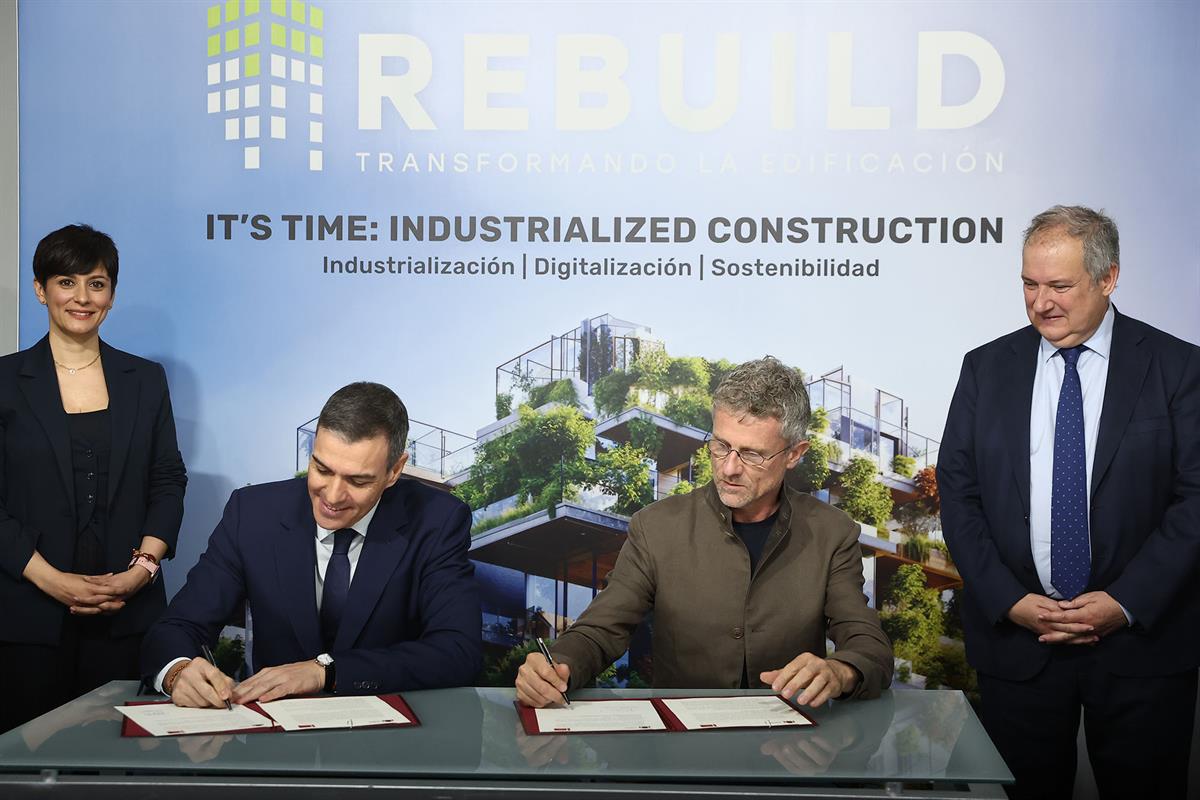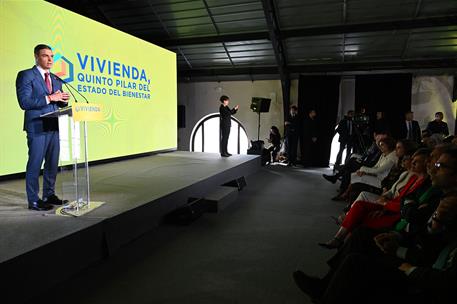Pedro Sánchez announces the launch of the PERTE for the Industrialisation of Housing with a public investment of €1.3 billion over 10 years
President's News - 2025.4.24
International Trade Fair (IFEMA), Madrid
 The President of the Government of Spain, Pedro Sánchez, during his speech at the 8th REBUILD building and construction trade fair (Pool Moncloa/Fernando Calvo)
The President of the Government of Spain, Pedro Sánchez, during his speech at the 8th REBUILD building and construction trade fair (Pool Moncloa/Fernando Calvo)
Pedro Sánchez made this announcement during the closing ceremony of the event 'Towards an industrialised construction', at the 8th edition of the REBUILD building and construction sector trade fair, which was held at IFEMA-Madrid. The event was attended by the Minister for Industry and Tourism, Jordi Hereu, and the Minister for Housing and Urban Agenda, Isabel Rodríguez, also took part.
Pedro Sánchez stressed the need for a "real paradigm shift in the building chain itself", focusing on its industrialisation, digitalisation and sustainability, with three objectives: "build more and better housing, build faster and at more affordable prices". For this reason, he added that "it is time to move decisively towards an industrialised building model" because it reduces the direct impact of waste and CO2 emissions, and improves working conditions. Faced with this "unprecedented challenge" in the building sector, he announced the launch of the new strategic project for the recovery and economic transformation (PERTE) of the Industrialisation of Housing, which will have a public investment of €1.3 billion over 10 years, through financial instruments capable of also mobilising private investment.
Placing Spain "at the forefront in the industrialisation of building"
 The Minister for Housing and Urban Agenda, Isabel Rodríguez, together with the President of the Government, Pedro Sánchez, and the Minister for Industry and Tourism, Jordi Hereu, during the event | Pool Moncloa/Fernando Calvo
The Minister for Housing and Urban Agenda, Isabel Rodríguez, together with the President of the Government, Pedro Sánchez, and the Minister for Industry and Tourism, Jordi Hereu, during the event | Pool Moncloa/Fernando Calvo
The chief executive explained that this is "a fundamental tool to place Spain at the forefront in the industrialisation of construction", following the delay in the development of this type of industry due to the lack of financing and the intention to involve private initiative. The new strategic project is articulated around three main strategic lines: increasing production capacity, efficiency and sustainability, and training and talent. Through the first, industrial housing production will be boosted by supporting the financing of industrial initiatives, contributing to "the creation of stable demand and creating a regulatory environment that encourages large companies in this country to commit to this technology", along with supporting the growth in scale of small and medium-sized enterprises that are committed to industrialisation, by financing the development of new industrial solutions. He said that the aim is to build an average of 15,000 industrialised homes per year and to reach 20,000 per year within 10 years.
In terms of efficiency and sustainability, he pointed out that the promotion of open industrialisation will allow us not only to build faster, reducing construction times by between 20% and 60%, but also to build "better", taking advantage of all the solutions that technology offers to make housing adapted to challenges such as climate change. Last, industrialisation will help to dignify employment in construction and "make it attractive to young people, with more security, more training and a better quality of life for those who choose this profession". To this end, work will be carried out with universities, vocational training centres and all agents to adapt a new talent training scheme at all levels: technical profiles, managers, promoters and installers, and also to "attract female intelligence and capacity to the sector".
The President explained that "we are launching this PERTE because industrialised construction is a priority and we have ample room for improvement in this area," pointing out that according to the most recent estimates, the use of modern construction methods in our country is below 5% of the total sector, compared to 20% in Germany and the Netherlands, and 10% in the UK. Although Spain is expected to double this volume by 2030, the President urged that we must aim "to be leaders in this field". To this end, he reiterated his request for the groups to support the Land Law in the Lower House of Parliament, "a necessary law agreed with the sector to give impetus to contain land prices and provide legal certainty to operators".
Valencia to host the City of Construction Industrialisation
 The President of the Government of Spain, Pedro Sánchez, during his speech at the 8th REBUILD building and construction trade fair | Pool Moncloa / Jose Manuel Álvarez
The President of the Government of Spain, Pedro Sánchez, during his speech at the 8th REBUILD building and construction trade fair | Pool Moncloa / Jose Manuel Álvarez
The chief executive also informed that within the framework of the new PERTE, which once again emphasises public-private collaboration as an essential element for its deployment, the new City for the Industrialisation of Construction will be established in the Logistics Activities area of the Port of Valencia, on land owned by SEPES, the Public Business Land Entity dependent on the Ministry of Housing. The new space will host industrial initiatives that can benefit from land and public funding, promote specialised training, showcase the sector's most innovative projects, and promote the exchange of information on new construction systems and products.
This will contribute to boosting the economic and industrial development of the areas most affected by the DANA of 29 October in Valencia. "Mitigating the effects of climate change requires us not only to build better, but to make good choices in terms of where we build. Denying the evidence leads to disaster", Pedro Sánchez emphasised, asking professionals and companies in the sector and the administration not to join the crusade against the protection of the territory. He also pointed out that the new strategic project is fed by European funds linked to reforms, warning that "without reforms and green policies, there are no funds. Without policies to protect and conserve the coastline and water resources, there is no European funding. Denying science and the green agenda is not only environmental suicide, but it is also economically irresponsible, and we will not allow it," he stated.
Housing, a priority for the Government
 The President of the Government of Spain, Pedro Sánchez, and the curator of the Venice Architecture Biennale 2025, Carlo Ratti, sign a manifesto | Pool Moncloa/Fernando Calvo
The President of the Government of Spain, Pedro Sánchez, and the curator of the Venice Architecture Biennale 2025, Carlo Ratti, sign a manifesto | Pool Moncloa/Fernando Calvo
Pedro Sánchez advocated "transforming the way we build to improve the way we live", and "acting decisively from all public authorities" - central government, regional governments and local bodies - in the face of the challenge of access to decent and affordable housing. The Government has increased the housing budget eightfold in seven years, with guarantees for buying and rental bonds for young people; it has promoted public-private collaboration with €4 billion in ICO credits for the construction of affordable rental, and it has transferred more than 3,300 homes and nearly 2 million square metres of residential land to the new Public Housing Company (Empresa Pública de Vivienda).
He recalled that all this comes following the approval of "a pioneering Housing Law that works wherever it is being applied", which is why he reiterated his call to all the administrations so that, "instead of boycotting or ignoring it, they apply it". In the field of refurbishment, Spain closed 2024 with more than 26,600 homes approved, 7% more than a year ago, and for the first time since the pandemic, more homes are being built than homes are being created: 127,721 new residential dwellings approved in 2024, compared to 111,000 new homes created in the same period. He was optimistic that this "is a hopeful change in trend", while urging that more work needs to be done as "it is not enough to cover the needs of a country that is growing and creating jobs like no other in the EU", as reflected in the latest IMF forecasts, which once again place Spain at the head of growth among the large advanced economies, tripling the average for the Eurozone.
At the end of the event, the President of the Government and the curator of the Venice Architecture Biennale 2025, Carlo Ratti, signed the manifesto proposed by the presidency of the Venice Architecture Biennale in defence of architecture as a tool in the fight against climate change.
Non official translation





